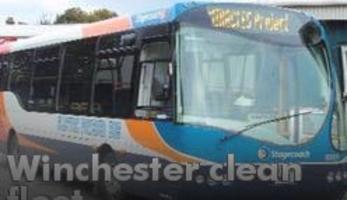Clean vehicle accreditation scheme Motorvate
Thematic areas
Clean & energy-efficient vehicles
Summary
MIRACLES and the local public transport operator in Winchester formed the Quality Bus Partnership, introducing new cleaner vehicles to the city’s bus and car fleets and renewing existing vehicles.
Implementing sustainable mobility
An air quality management area was declared for Winchester in November 2003, due to high concentrations of air pollutants in the city centre. To improve air quality in the city the MIRACLES project encouraged the take-up of cleaner fuels and technologies and ran a campaign to raise awareness of the benefits of environmentally friendly vehicles.
The main public transport operator in the area, Stagecoach, had a fleet of nearly 60 buses serving Winchester. Prior to MIRACLES, Stagecoach had already set up a rolling programme to upgrade its fleet to Euro II emissions standard, but in partnership with Hampshire County Council it was decided, through MIRACLES, that this should be extended to meet the Euro III standards introduced in 2001.
The specific objectives were to:
- reduce the environmental impact of the public transport fleet;
- reduce the environmental impact of the County Council’s fleet in the Winchester area and beyond; and
- overcome barriers to the introduction of new engine technologies and establish a business case for clean vehicles.
Progress
The Quality Bus Partnership was agreed between MIRACLES and Stagecoach in September 2003. In November 2003, 13 new Euro III buses were added to the Winchester fleet. Through the partnership, an ongoing programme of retrofitting was agreed for the Winchester bus fleet to bring all mid-life vehicles up to Euro III standard or better. Clean-up grants were applied for from the governmental organisation Energy Savings Trust in order to provide additional funding for the retrofitting programme.
Buses running on alternative fuels, including electric-powered buses, were tested on the park and ride service to raise awareness of the different technologies available and to gauge public reaction. Hampshire County Council purchased seven pool vehicles running on liquefied petroleum gas (LPG) and 30 Euro IV pool vehicles. The performance of these vehicles was monitored so that the findings could be used to inform future decisions regarding the renewal of the counci’s fleet vehicles. The County Council signed up to Motorvate, the green fleet accreditation scheme, in March 2004. Motorvate assessed the emissions status and efficiency of a selection of the council’s fleet vehicles and employee-owned vehicles used for work purposes. MIRACLES and Motorvate held a workshop, encouraging local businesses to consider the environmental impacts of their fleets. Advice was offered to local businesses interested in incorporating cleaner vehicles into their fleet. Six alternative fuel vehicles were purchased by the County Council: two hybrid petrol/electric cars; two dual-fuel LPG/petrol cars; and two battery electric vans. These vehicles were available free to local businesses for four-week trials, allowing Winchester businesses to experience for themselves the performance of alternative fuel vehicles and the possibilities of incorporating them into their own fleets.
Outcomes
The retrofitting of the local bus fleet was ongoing and continued after the end of the project period. Once complete, it was hoped that Winchester would have one of the cleanest bus fleets in Europe. Based on their analysis of Hampshire County Council’s vehicles, Motorvate was able to advise the council on how to improve the fuel efficiency and emissions status of its fleet. The Motorvate targets for the council were reassessed in March 2006, but the results were available only after the end of the MIRACLES project.
Following the Motorvate workshop, local businesses were invited to join the Motorvate scheme. Although it was hoped that the vehicle trials would encourage local businesses to purchase their own alternative fuel vehicles for use in the Winchester area, the aim to get at least four companies to sign up to Motorvate before the end of the project was not achieved and no companies that attended the seminar in December 2004 subsequently bought a clean fleet of vehicles or joined Motorvate, partly due to the high joining fee and partly to the availability of advice and “fleet health checks” free of charge from other companies.








